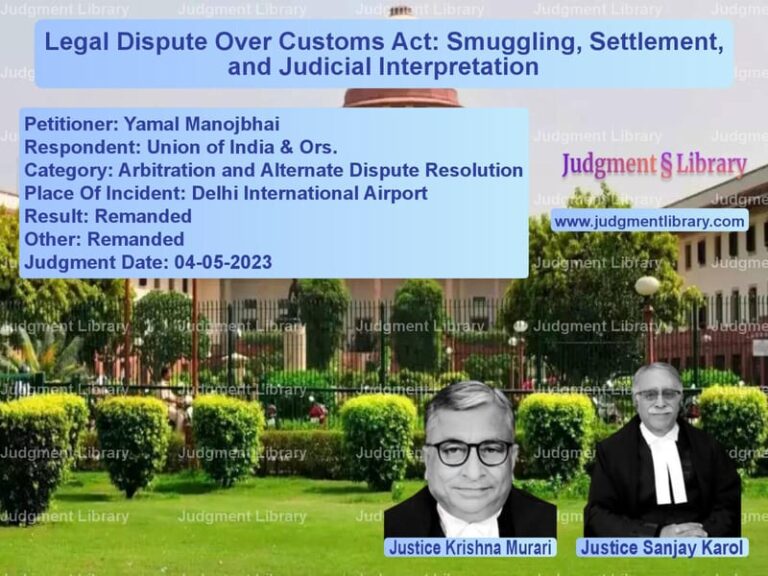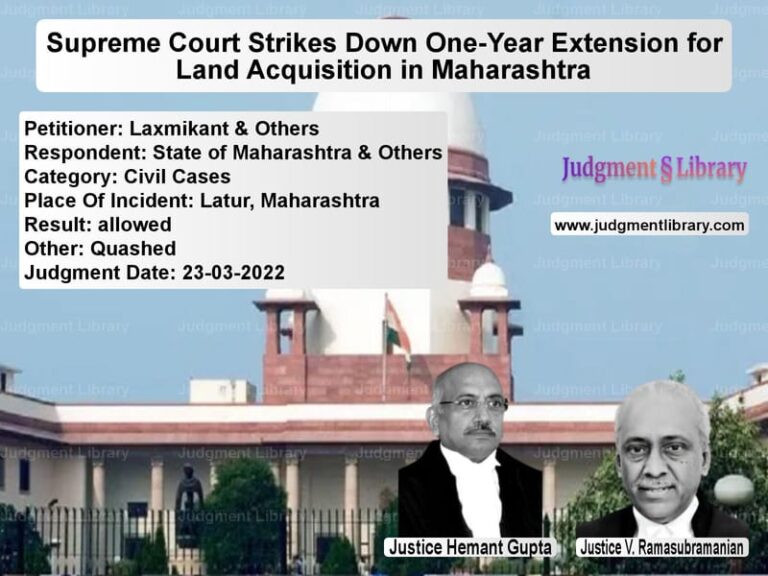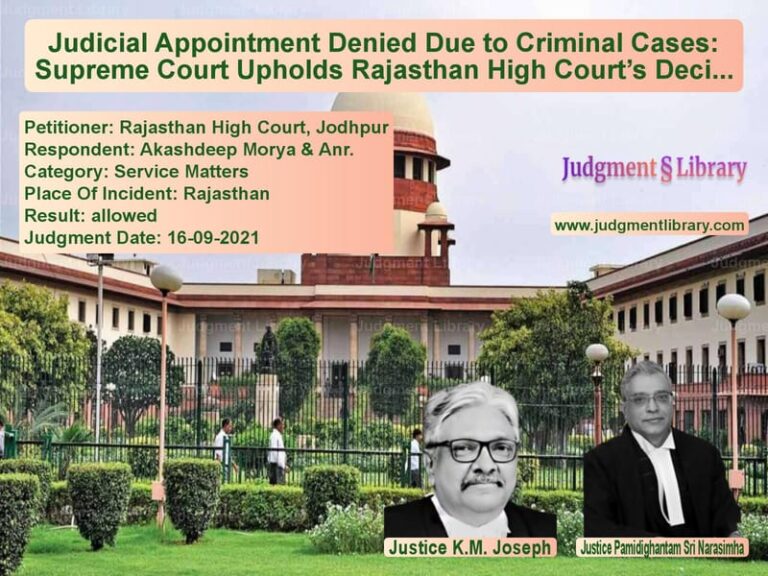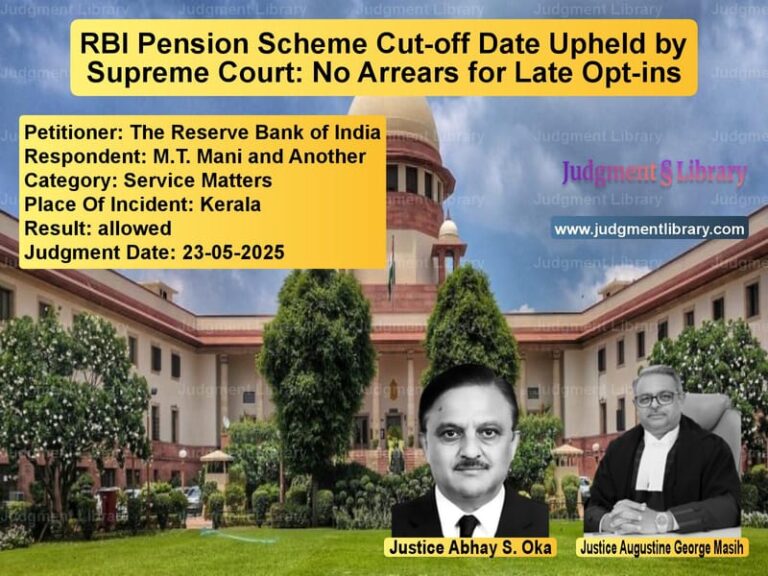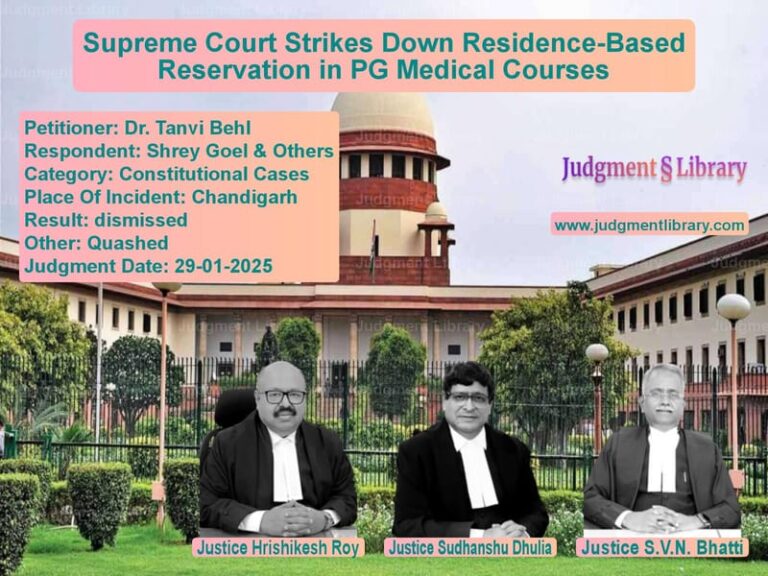Legal Jurisdiction in Debt Recovery: Civil Court vs. DRT for Borrower Suits
The judgment at hand addresses the legal issues surrounding the jurisdiction of Civil Courts and Debt Recovery Tribunals (DRTs) in debt recovery proceedings. Specifically, it examines whether an independent suit filed by a borrower against a bank or financial institution, which has applied for recovery of its loan under the Recovery of Debts Due to Banks and Financial Institutions Act (RDB Act), is liable to be transferred and tried along with the application under the RDB Act. The case revolves around a conflict regarding the jurisdiction of Civil Courts in suits filed by borrowers against banks, and the power of the DRT to handle such cases.
Factual Background
The Bank of Rajasthan Ltd. (now amalgamated with ICICI Bank) had sanctioned a term loan to the respondent company, VCK Shares & Stock Broking Services Ltd., in 1994. Over time, the respondent failed to adhere to financial discipline, leading to the issuance of a notice by the appellant bank. In response, the appellant filed an application under Section 19 of the RDB Act for the recovery of the loan amount before the Debts Recovery Tribunal (DRT). The respondent, however, filed a Civil Suit before the Kolkata High Court, seeking various declarations and reliefs, including a decree for the sale of pledged shares and an inquiry into the losses suffered due to the bank’s actions.
Read also: https://judgmentlibrary.com/icsi-election-dispute-supreme-court-reinstates-elected-office-bearers/
In 1998, the appellant sold pledged shares to recover part of the loan, which led the respondent to file another suit, claiming that the sale was void and that the bank had no right to recover the loan amount. The appellant responded by filing applications to dismiss the suits, arguing that the matters should be adjudicated by the DRT, not the Civil Court. The Civil Court, however, rejected this argument, leading to an appeal, which ultimately reached the Supreme Court.
The Legal Arguments
The appellant, Bank of Rajasthan, argued that the respondent’s suit was not maintainable in the Civil Court because the matter concerned the recovery of a debt, which was under the jurisdiction of the DRT as per the RDB Act. The appellant also contended that since the debt recovery proceedings had already been initiated before the DRT, the respondent should have raised any claims through a counterclaim in the ongoing DRT proceedings. The appellant further relied on the provisions of the RDB Act, which, they argued, explicitly barred Civil Court jurisdiction in debt recovery matters and required all proceedings related to debt recovery to be handled by the DRT.
On the other hand, the respondent argued that the jurisdiction of the Civil Court was not ousted by the RDB Act, and that they had a right to pursue their suit independently. The respondent pointed out that while the RDB Act provides for debt recovery by banks, it does not preclude borrowers from filing suits in the Civil Court. The respondent’s position was that the RDB Act only barred Civil Court jurisdiction for suits filed by banks for the recovery of debt, not suits filed by borrowers against banks. They also argued that there was no provision in the RDB Act for the transfer of suits from the Civil Court to the DRT, and the Civil Court should retain jurisdiction over their claims.
The Court’s Consideration
The Supreme Court first analyzed the provisions of the RDB Act, specifically Sections 17 and 18, which delineate the jurisdiction of the DRT and the Civil Court. Section 17 confers exclusive jurisdiction on the DRT to entertain and decide applications from banks and financial institutions for recovery of debts. However, Section 18 clarifies that the Civil Court’s jurisdiction is not barred in matters outside the purview of the RDB Act. The Court noted that while the RDB Act provides a summary procedure for banks to recover debts, it does not oust the jurisdiction of the Civil Court in suits filed by borrowers against banks.
The Court also considered the provisions of Section 19 of the RDB Act, which allow for the filing of counterclaims and set-offs by defendants in applications filed by banks. The Court noted that while the RDB Act allows for counterclaims to be raised in debt recovery proceedings before the DRT, it does not preclude the filing of independent suits by borrowers in the Civil Court. The Court referred to previous judgments, including the Indian Bank and Nahar Industrial Enterprises cases, which clarified that the RDB Act does not bar the jurisdiction of the Civil Court for suits filed by borrowers against banks. However, the Court also emphasized that the DRT has the jurisdiction to handle counterclaims and set-offs raised by defendants in debt recovery proceedings.
The Court’s Ruling
The Court ruled that the jurisdiction of the Civil Court is not ousted by the RDB Act in suits filed by borrowers against banks. The Court concluded that borrowers are free to file independent suits in the Civil Court, and such suits cannot be transferred to the DRT unless they meet the specific criteria for counterclaims or set-offs under the RDB Act. The Court held that while the DRT has jurisdiction over debt recovery applications filed by banks, it does not have jurisdiction over independent suits filed by borrowers. The Court also clarified that the filing of a separate suit by the borrower does not preclude the DRT from hearing the bank’s debt recovery application, as long as the two matters are not inextricably connected.
Additionally, the Court emphasized that the DRT should continue to expeditiously handle debt recovery applications filed by banks, and the filing of independent suits by borrowers should not impede the DRT’s proceedings. The Court ruled that while borrowers have the right to file suits in the Civil Court, they cannot seek to stay the DRT’s proceedings pending the outcome of their Civil Court suits. The Court also stated that the filing of independent suits by borrowers should not delay the debt recovery process and that both the Civil Court and DRT should proceed with their respective proceedings without interference.
Conclusion
The Supreme Court’s judgment in this case clarifies the interplay between the jurisdiction of the Civil Court and the DRT in debt recovery matters. While the RDB Act provides for exclusive jurisdiction to the DRT in debt recovery cases filed by banks, the Court ruled that borrowers are not precluded from filing independent suits in the Civil Court. The Court emphasized the need for a balanced approach, where the DRT’s jurisdiction over debt recovery proceedings is respected, while borrowers retain the right to seek redress in the Civil Court. The judgment provides clarity on the procedural aspects of debt recovery and the rights of borrowers, ensuring that both parties can pursue their claims without unnecessary delay or jurisdictional conflicts.
Petitioner Name: Bank of Rajasthan Ltd..Respondent Name: VCK Shares & Stock Broking Services Ltd..Judgment By: Justice Sanjay Kishan Kaul, Justice Abhay S. Oka, Justice Vikram Nath.Place Of Incident: New Delhi.Judgment Date: 10-11-2022.
Don’t miss out on the full details! Download the complete judgment in PDF format below and gain valuable insights instantly!
Download Judgment: bank-of-rajasthan-lt-vs-vck-shares-&-stock-b-supreme-court-of-india-judgment-dated-10-11-2022.pdf
Directly Download Judgment: Directly download this Judgment
See all petitions in unfair trade practices
See all petitions in Bankruptcy and Insolvency
See all petitions in Commercial Arbitration
See all petitions in Judgment by Sanjay Kishan Kaul
See all petitions in Judgment by Abhay S. Oka
See all petitions in Judgment by Vikram Nath
See all petitions in dismissed
See all petitions in supreme court of India judgments November 2022
See all petitions in 2022 judgments
See all posts in Corporate and Commercial Cases Category
See all allowed petitions in Corporate and Commercial Cases Category
See all Dismissed petitions in Corporate and Commercial Cases Category
See all partially allowed petitions in Corporate and Commercial Cases Category



